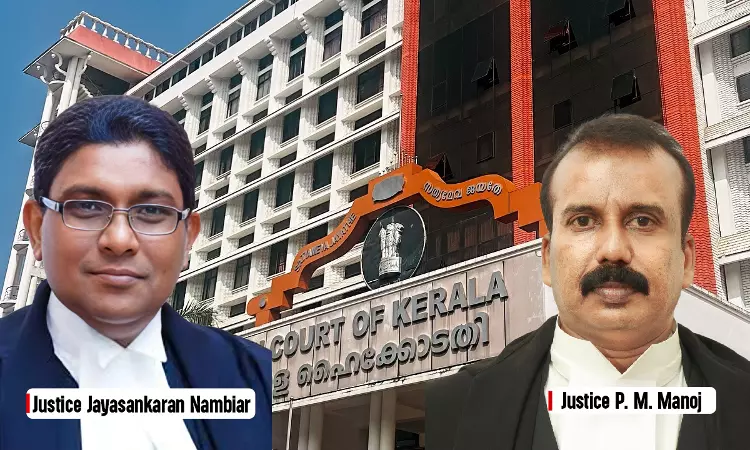- Home
- /
- High Courts
- /
- Kerala High Court
- /
- Assessment Based On DVO's Valuation...
Assessment Based On DVO's Valuation Cannot Be Revised U/S 263 Of Income Tax Act In Absence Of Concrete Material: Kerala High Court
Mehak Dhiman
28 Jun 2025 12:40 PM IST
The Kerala High Court held that assessment based on DVO's (Department Valuation Officer) valuation cannot be revised under Section 263 of Income Tax Act in absence of concrete material. Justices A.K. Jayasankaran Nambiar and P.M. Manoj observed that “as on the date of invoking his power under Section 263 of the IT Act, the Commissioner could not have had a 'reason to believe' that...
The Kerala High Court held that assessment based on DVO's (Department Valuation Officer) valuation cannot be revised under Section 263 of Income Tax Act in absence of concrete material.
Justices A.K. Jayasankaran Nambiar and P.M. Manoj observed that “as on the date of invoking his power under Section 263 of the IT Act, the Commissioner could not have had a 'reason to believe' that the assessment was erroneous and prejudicial to the interest of the Revenue since the material to inform that 'reason to believe' did not exist on the date of issuance of the show cause notice. His exercise of power under S.263 was therefore clearly unjustified”.
The assessee/respondent had entered into an agreement for the sale of land and had immediately thereafter put the intended purchaser of the land in possession of the property.
Although the sale deed and the correction deed were executed in the financial year 2011-2012, and under normal circumstances the assessment to capital gains in respect of the said transactions would have featured only in the assessment orders for the year 2012-2013 under the Income Tax Act, the assessment of the assessee to capital gains was completed in the assessment year 2011- 2012 by invoking the provisions of Section 2(47) of the Income Tax Act read with Section 53A of the Transfer of Property Act.
The assessee filed an appeal against the said order of the Assessing Officer. The First Appellate Authority directed to fix the land value at Rs.50,000/- per Cent and remitted the matter back to the Assessing Officer for a fresh computation of capital gains.
The Revenue filed an appeal against the said order of the First Appellate Authority before the Appellate Tribunal. The Tribunal on its part vacated the findings of the authorities below and held that the fair market value had to be arrived at after ascertaining the views of the Department Valuation Officer (D.V.O).
Thus, the matter was referred to the D.V.O by the Assessing Officer to whom the matter now stood remanded. Based on the report received from the D.V.O, the Assessing Officer proceeded to pass orders giving effect to the order of the Appellate Tribunal by taking note of the fair market value fixed in the report and completing the assessment to capital gains on the assessee.
Finding the assessment completed by the Assessing Officer to be erroneous and prejudicial to the Revenue, the Commissioner invoked his powers under Section 263 of the Income Tax Act and issued a show cause notice dated 08.02.2021 to the assessee.
The bench agreed with the Appellate Tribunal that “once it was clear that the Assessing Officer had complied with the directions issued by the Appellate Tribunal, and had adopted the value as fixed by the D.V.O for the purposes of completing the assessment in relation to the assessee, it was not open to the Commissioner of Income Tax to invoke the powers under Section 263 for suo motu revising the order of the Assessing Officer under the Income Tax Act, more so when the real reason for invoking his power under Section 263 was only that there was a doubt raised by the Assistant Engineer of the Valuation Cell as regards the fixation of the fair market value by the D.V.O.”
The bench observed that at any rate, the clarifications sought for by the Assistant Engineer, Valuation Cell in the letter were not sent to that office, and a final determination as to whether or not the queries raised merited consideration, was not obtained at any time before the issuance of a show cause notice dated 08.02.2021 invoking the powers under Section 263 of the Income Tax Act.
As on the date of invoking his power under Section 263 of the IT Act, the Commissioner could not have had a 'reason to believe' that the assessment was erroneous and prejudicial to the interest of the Revenue since the material to inform that 'reason to believe' did not exist on the date of issuance of the show cause notice. His exercise of power under S.263 was therefore clearly unjustified, added the bench.
In view of the above, the bench dismissed the appeal.
Case Title: The Principal Commissioner of Income Tax v. M/s Ayyappa Roller Flour Mills Ltd.
Citation: 2025 LiveLaw (Ker) 366
Case Number: ITA NO. 9 OF 2024
Counsel for Appellant/ Department: Jose Joseph and P.K. Ravindranatha Menon
Counsel for Respondent/ Assessee: P. Sathisan, Javed Haider, Abhiram Sunish, Biju P. Paul and Shibu B.S



